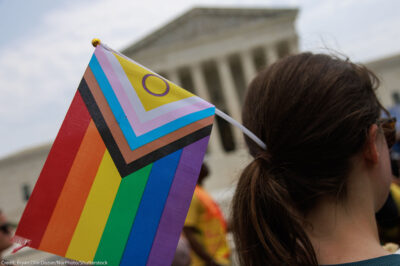Arguments just ended in our legal challenge to Prop. 8. At issue in the case is whether the ballot initiative process can be used to take away a fundamental right only for one group of Californians based on a trait โ in this case sexual orientation โ that has no relevance to the groupโs ability to participate in or contribute to society.
We filed the challenge with (NCLR) and on November 5, after Prop. 8 was approved by just 52 percent of the voters on Election Day. In court today, the groups argued that it was improper for the proponents of Prop. 8 to use the ballot initiative process to strip same-sex couples of the fundamental right to marry. The groups contend that changes to the Constitution that alter its core requirement of equal protection by selectively depriving minorities of fundamental constitutional rights cannot be accomplished through a simple majority vote. Such major changes of core structural principles are revisions to the Constitution that can only be put on the ballot by a two-thirds vote of both houses of the legislature.
A constitutional democracy is built on two basic ideas: The people are in charge, but there are limits on the majorityโs power over minorities. The people get to vote on most things, but we donโt put the fundamental rights of a disfavored minority up for a vote. But thatโs exactly what happened with the passage of Prop. 8.
This case is not just about marriage or gay people. If a simple majority of the voters can take this core right away from gay people, it can take any right away from any other group as well (Kenneth Starr โ who argued for the supporters of Prop 8 โ acknowledged this in court today). If Prop. 8 is upheld, then Californians could, for example, vote to take religious freedom away from Muslims, or free speech rights away from women, or the right to vote away from Chinese-Americans. This case is important for every Californian: itโs about whether the limits weโve set on the power of the majority have meaning.
The California courts have a solemn responsibility to enforce the state constitution to protect the rights of all people, regardless of popular opinion. We hope the court will recognize that it is not just the rights of lesbian and gay people, but the rights of all Californians that it must protect by striking down Proposition 8.
The court is expected to rule within 90 days. Stay tuned for further updates.


